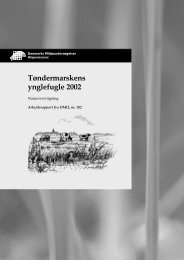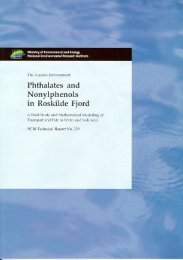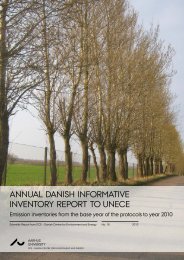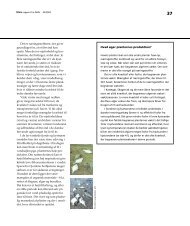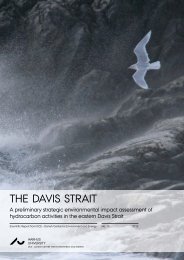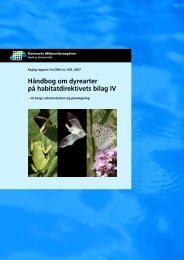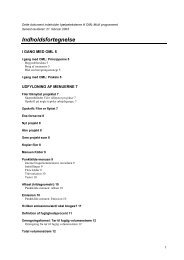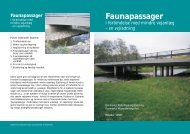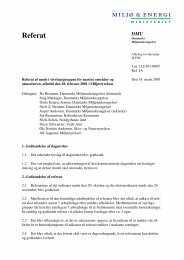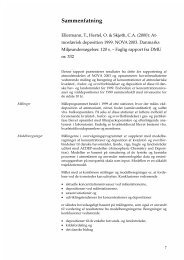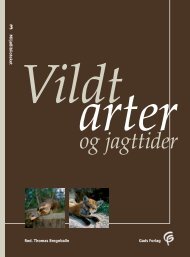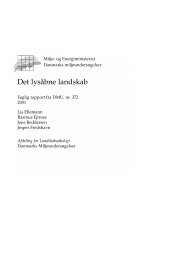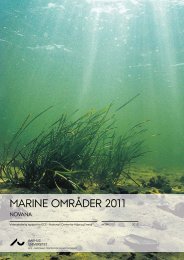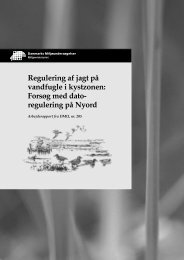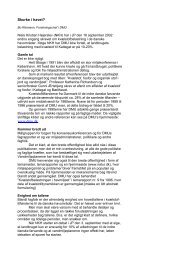River Restoration
River Restoration
River Restoration
You also want an ePaper? Increase the reach of your titles
YUMPU automatically turns print PDFs into web optimized ePapers that Google loves.
Danish regional and national<br />
authorities have accumulated considerable<br />
experience and know-how regarding<br />
watercourse and river valley management<br />
and restoration during the last decade,<br />
both with respect to legislation, conservation<br />
and administration, as well as to<br />
practical experience in carrying out<br />
different management and restoration<br />
measures in river systems and monitoring<br />
of their ecological effects.<br />
Environmentally sustainable management<br />
and restoration of watercourses was<br />
included in the Danish Watercourse Act<br />
as early as 1982, and in 1987 nature<br />
restoration was introduced as an element<br />
of the 1987 “Strategy on Marginal<br />
Lands”, the aim of which was to restore<br />
20,000 ha of former wetlands. More than<br />
1,000 small and larger-scale river<br />
restoration projects have so far been<br />
undertaken, primarily by the Danish<br />
Counties and Municipalities.<br />
The National Environmental Research<br />
Institute (NERI) is the national platform in<br />
Denmark for monitoring and scientific<br />
research on watercourse and river valley<br />
management and restoration. In Denmark<br />
watercourse and river valley management<br />
and restoration projects are mainly<br />
undertaken by the Counties and<br />
municipalities with the support of the<br />
Danish Environmental Protection Agency<br />
and the Danish Forestry and Nature<br />
Agency. NERI collaborates with the local<br />
and central authorities on the collection<br />
of information on watercourse and river<br />
valley management and restoration and<br />
the dissemination of the experience<br />
gained through newsletters, workshops,<br />
training courses, technical handbooks,<br />
videos, etc.<br />
In 1993, the EU Life Programme<br />
granted funds to establish a major<br />
European Demonstration Project in<br />
Denmark and the United Kingdom led by<br />
the Sønderjylland County. As part of this<br />
project the European Centre for <strong>River</strong><br />
<strong>Restoration</strong> (ECRR) was established at<br />
NERI in Silkeborg in 1995.<br />
NERI<br />
Denmark<br />
Figure 1.1.<br />
The European<br />
Centre for <strong>River</strong><br />
<strong>Restoration</strong> and the<br />
European <strong>River</strong><br />
<strong>Restoration</strong><br />
Network.<br />
European Centre for <strong>River</strong> <strong>Restoration</strong><br />
ECRR<br />
European Network<br />
National Network<br />
NERI is a sectorial research institute<br />
under the Danish Ministry of Environment<br />
and Energy and is the Danish National<br />
Focal Point for the European Environment<br />
Agency (EEA). In addition, NERI<br />
departments currently participate in three<br />
European Topic Centres, undertaking<br />
projects for the EEA in international fora<br />
concerning monitoring, establishment of<br />
databases, etc. NERI currently has around<br />
450 members of staff, as well as 30 PhD<br />
students and 56 MSc students.<br />
The main aims of the ECRR are to<br />
promote sustainable watercourse and<br />
river valley management and restoration<br />
measures and ensure widespread take-up<br />
and dissemination of related management<br />
and restoration activities. The<br />
Centre focuses on establishing a state-ofthe-art<br />
information base on watercourse<br />
management and restoration of natural<br />
habitats in damaged watercourses and<br />
their river valleys. This will be achieved<br />
using experience gathered in the European<br />
Countries concerning watercourse<br />
management and restoration concepts<br />
and methodology, as well as on the<br />
planning, execution and impact<br />
monitoring of restoration projects.<br />
The aims of the ECRR will be achieved<br />
through developing a European Network<br />
of relevant national institutions (Figure 1.1).<br />
The Centre and the European <strong>River</strong><br />
<strong>Restoration</strong> Network will collaborate on<br />
ensuring the collection and assessment of<br />
experience and knowledge obtained<br />
throughout Europe on watercourse and<br />
river valley management and restoration,<br />
as well as the dissemination of the<br />
information to the European audience<br />
through newsletters, conferences,<br />
workshops, technical handbooks, videos,<br />
etc. In addition, the ECRR and the<br />
Network will promote watercourse and<br />
river valley management and restoration<br />
through the initiation of Demonstration<br />
Projects in each European country. These<br />
activities will ensure that knowledge on<br />
river and river valley management and<br />
restoration will be communicated to the<br />
widest possible European audience for<br />
the benefits of Nature and Society.<br />
The present volume is the ECRR’s first<br />
handbook and is intended to demonstrate<br />
to the European audience the experience<br />
accumulated in Denmark on watercourse<br />
and river valley management and<br />
restoration. For further information you<br />
are welcome to contact the ECRR in<br />
Silkeborg. The Centre can demonstrate<br />
Danish experience via posters and videos<br />
and can arrange for tours to Demonstration<br />
Project sites in various parts of<br />
Denmark.<br />
The ECRR’s address and telephone<br />
number is as follows:<br />
European Centre for <strong>River</strong> <strong>Restoration</strong><br />
National Environmental Research Institute<br />
Vejlsøvej 25, P.O.Box 314<br />
DK-8600 Silkeborg, Denmark<br />
Tel. +45 89 201 400<br />
Fax. +45 89 201 414<br />
e-mail ECRR@dmu.dk<br />
Basis for watercourse<br />
rehabilitation<br />
Watercourse rehabilitation is purposeful<br />
improvement of the physical and ecological<br />
condition of watercourses. It is a rapid<br />
and direct means of achieving the<br />
improvements one would like to see take<br />
place in watercourses, and in some cases<br />
7<br />
Introduction



